

The Role of Businesses in Colombia’s Conflict Cannot Be Ignored. When Colombian President Juan Manuel Santos met with President Donald Trump in Washington, D.C., discussion of the Colombian implementation of the peace deal took a backseat to other issues, including the importance of continued economic cooperation.
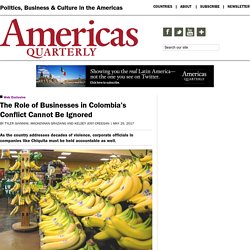
“We are and wish to continue to be the best destination in Latin America for American businesses,” Santos commented in a joint press conference. In Colombia, however, conflict and business prospects have been historically entwined, and for peace and economic cooperation to progress, the legacy of U.S. businesses in fueling the country’s decades-long conflict must be addressed. Chiquita Brands International is a case in point. The company admitted to paying $1.7 million between 1997 and 2004 to the right-wing Colombian paramilitary group Autodefensas Unidas de Colombia (AUC), which was notorious for brutal attacks against civilians at the time. That choice to put profit over peace has left a lasting mark. The Supreme Court Should Take Up Chiquita's Terrorism Sponsorship Case.
Eight years have passed since Chiquita, the global fruit giant, was convicted on felony charges of having financed terrorism in Colombia.
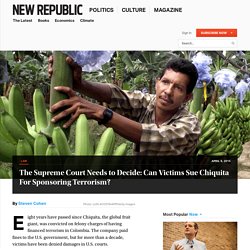
The company paid fines to the U.S. government, but for more than a decade, victims have been denied damages in U.S. courts. The reason? It’s simply not yet clear whether U.S. law guarantees foreigners the right to sue companies under U.S. jurisdiction, even for crimes committed, in part, in the United States. Het probleem dat illegale mijnbouw heet! Colombia is gezegend met een grote hoeveelheid natuurlijke rijkdommen.
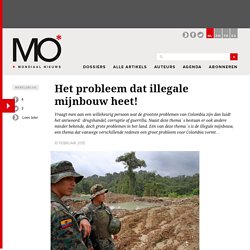
Rijkdommen als goud, steenkool, nikkel, koper, zilver, platina en edelstenen hebben bijgedragen aan de economisch groei van het land. De mijnbouw is tegenwoordig een wezenlijk onderdeel van de economie en sinds het aantreden van President Santos neemt deze sector een steeds belangrijkere rol in. De mijnbouw als locomotief van groei Santos noemde bij zijn aantreden in 2010 de mijnbouw, samen met infrastructuur, huisvesting, landbouw en innovatie, één van de vijf locomotieven achter de groei van Colombia. Deze vijf sectoren zijn volgens Santos van vitaal belang voor de economische groei van het land en moeten bijdragen aan het bereiken van meer werkgelegenheid en minder armoede.
De afgelopen jaren maakte de mijnbouw een jaarlijkse groei door en tegenwoordig staat het in voor 2,3% van het totale Bruto Binnenlandse Product van Colombia. Gevolgen voor het milieu Met de staat als afwezige is het milieu de grote verliezer. Why is large-scale mining a human rights issue in Colombia? Colombia News. Foreigners and citizens often think of Colombia as a land of paradoxes.
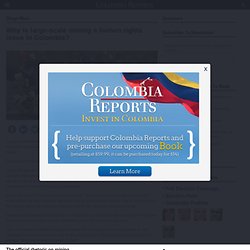
Though the country is filled with natural resources and biodiversity, it was recently ranked third most unequal in the region. Colombians in the streets commonly wonder: “why are we so poor if our land is so rich?” During the past four Colombian administrations, mining gold, coal and other minerals in high-demand seems to have been the solution to this paradox. In fact, these governments have decided to go deep into the land to extract that richness and turn it into wealth so as to compensate for what is missing on the surface. By the end of 2012, mineral extraction took over 1,8% of the Colombian national territory[1], while 35% of the total landmass was promised as a potential mining site. Colombia's Emerald Tsar - People & Power - Al Jazeera English - Waterfox. Colombia is known for many things.
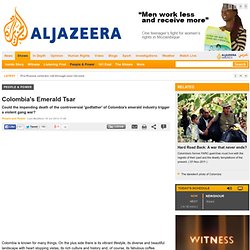
On the plus side there is its vibrant lifestyle, its diverse and beautiful landscape with heart stopping vistas, its rich culture and history and, of course, its fabulous coffee. On the debit side there is its unfortunate place at the top of the world league of cocaine producers and a reputation for violence born out of South America's longest running armed conflict, between government forces, left-wing insurgents and right-wing paramilitaries. And then there are its emeralds. To those who covet the sparkling green gems, Colombia is where the very finest stones - those with the deepest colour and fewest imperfections and trace elements - are to be found. Emeralds have been mined there since antiquity and were as much prized by the Incan nobility as they were by the Spanish conquistadors who spread across the 'new world' in the 16th century. Emerald wars. Just the Facts - U.S. military aid to Latin America and the Caribbean - Waterfox.
Este blog ahora se puede leer en español aquí During the last week of April a group from the Washington Office on Latin America (WOLA, Washington), the Center for International Policy (CIP, Washington), Asociación MINGA (Bogotá), and the Institute for Development and Peace Studies (INDEPAZ, Bogotá) traveled to Tumaco, on the Pacific coast of Colombia’s far southwest, near the border with Ecuador.
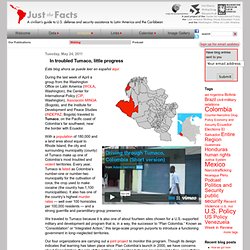
With a population of 180,000 and a land area about equal to Rhode Island, the city and surrounding municipality (county) of Tumaco make up one of Colombia’s most troubled and violent territories. Every year, Tumaco is listed as Colombia’s number-one or number-two municipality for the cultivation of coca, the crop used to make cocaine (the country has 1,100 municipalities). It also has one of the country’s highest murder rates — well over 100 homicides per 100,000 residents — and a strong guerrilla and paramilitary-group presence. 111203_mining_in_colombia_web.pdf (application/pdf Object)
Sovereignty For Sale: Corporate Land Grab in Colombia. "Buy land, they’re not making it anymore.”
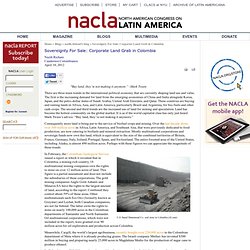
-Mark Twain There are three main trends in the international political economy that are currently shaping land use and value. Chiquita Republic: United Fruit in Colombia. Source: In These Times In the late 1990s, in one of many chapters in the Colombian government’s decades-old dirty war with leftist guerrillas, more than 15,000 people in the northern region of Curvaradó were forced from their land.
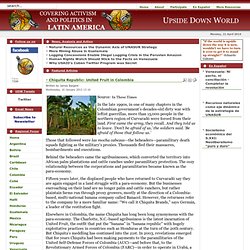
First came the army, they recall. And they told us to leave. ‘Don’t be afraid of us,’ the soldiers said. ‘Be afraid of those that follow us.’ Those that followed were las mocha cabezas—the beheaders—paramilitary death squads fighting as the military’s proxies.